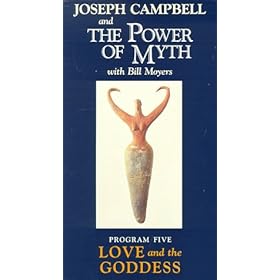 Summary
Summary Man is both gift and goddess, both life and matter. (“Men” and “man” are used here to denote the male gender and not “mankind” generally). Birth, weaning, ritualizing the hunt, questing for father, and finally dying, men are part of the womb, the genderless Upanishads goddess incarnate. No matter the journey, men can’t stray far from the source, the goddess. “Myth,” according to Campbell, is the “sublimation of mother nature” (205). Does this mean goddess myths are archetypal of all myth?
Analysis
What Campbell may be saying is that even hunter mythologies can’t journey beyond the goddess; she’s within us, the universal “X” chromosome of life’s genderless chassis—nipples on men—logically constructed in the Aristotelian syllogism: all people are the goddess, men are people, therefore men are the goddess. Let us examine how hunter mythology superficially strays from the goddess, but remains loyal, nevertheless.
Yahweh usurps creation from the goddess, creating a duality that separates God from matter, and man from his spiritual self. Outward-facing hunter mythologies address duality externally; the psychological implications are profound, they force heroic journey and transcendence to man’s occult interior. The therapeutic quest. In the larger context of the goddess, she gives man no choice—all matter is vibrating energy, all energy, vibrating matter; both are incapable of simultaneous measurement.
Without the benefit of quantum physics, the ancient Upanishads intuitively says that “we and the earth are the same” (211). Science proves it.
The father quest is another example of artificial duality trapped within a holistic system. Man cleaves to his mother, then quests for connection with the “spiritual” father to reveal character and foreshadow destiny; ultimately he returns “reborn.” But there’s no rebirth without the goddess, she is second birth’s “spiritual mother” (224). Hunter mythology feebly attempts to make linear what is inherently circular, the goddess.
Yahweh is actually in touch with his own inner goddess. For example, Hebrew funerals require burial, or “planting,” with rituals that assure rebirth in Jerusalem. Also, Hebrew’s bodies are “sacred;” suicide and tattoos are prohibited because defacing man is tantamount to defacing God who created man in his own image. Similarly, goddess myth sanctifies all life, including the earth since “Your body is her body” (229). The reasoning is different, Yahweh is aloof from his creation while the goddess is the creation; the practical result is the same.
Opinion
Hunter myth dupes itself into “replacing” the goddess, but she owns it. If Yahweh smites the “abomination” (216) he’d die by his own hand, matter and energy cease to exist. Perhaps without artificial duality, spiritual death and rebirth might be easier or unnecessary. Not likely. As Nietzsche said, “man is the sick animal.” Existential crisis spawns vision quests. We might get sidetracked with unworthy journeys, macho myths, heartless paths, or even Paris Hilton; but we transverse Her womb, the Mobius loop of life, the cosmic circle of the goddess. Mothers’ Day cannot be forgotten.

No comments:
Post a Comment